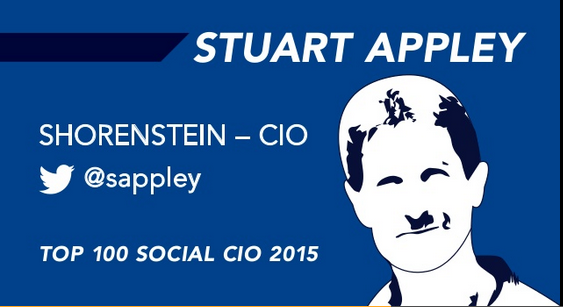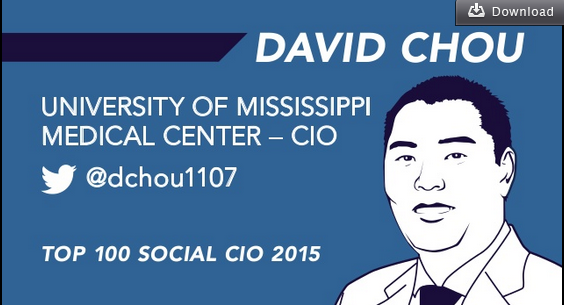Although it may seem like old news to some of you, Vala Afshar of Extreme Networks releases a list of Top 100 Social CIOs each year on Huffington Post. If you're curious to seek who made the cut, you can check out the 2015 list or the 2014 list.
What you don't often get is a Top 100 CIO's point of view on why bother to use Twitter when a person has so many other issues to grapple with an hourly, daily, weekly, monthly, or even yearly basis. Now's your chance to get the "inside" scoop, by checking out what Stuart Appley, CIO at Shorenstein, shared in his LinkedIn blog post.
Full disclosure: Stuart happens to be a Constellation Executive Network member. Plus, Extreme Networks and LinkedIn happen to be a couple of the many innovative companies that work with us at Constellation Research. In fact, Stuart's not the only Top 100 Social CIOs who's a part of our founding group of innovative leaders and thinkers in this growing executive community. David Chou, CIO from the University of Mississippi Medical Center is another one who's a part of this select group.


What you'll notice is, if you follow either of these CIOs on Twitter, that they're very forthcoming with information and share regularly, which is probably why they're such a natural fit for our executive community. Membership automatically provides easy access to our globe-trotting, social media-friendly analysts, who're just as open to sharing on Twitter as they are.
One of the best aspects of my job is that I get to connect with executives like these who are open to business innovation and seek to be change agents, not IT gatekeepers. It's incredibly refreshing and downright invigorating to know that we continue to have leaders at the helms of organizations who share this mindset because that is how digital business gets disrupted.
Both Stuart and David are actually going to be speaking at our flagship innovation conference, Constellation Connected Enterprise 2015, in Half Moon Bay, California on November 4th-6th. If you want to meet forward-thinking, approachable executives like Stuart and David, here are a few options:
1) consider joining the Constellation Executive Network
2) reserve your seat for Constellation's Connected Enterprise 2015
3) start following these 2015 Top 100 CIOs on Twitter: @sappley, @dchou1107
Leading in a digital world is frankly, more demanding than ever, especially with the burgeoning mobile usage explosion. Check out Gavin Heaton's blog post, Cheating Strategist's Guide for Mary Meeker's Digital Trends, to see what I mean.
For those of us in the wait-and-see mode, it's time to get cracking because that is a global phenomenon that is sweeping the business landscape in broad strokes, and according to our intrepid leader, R "Ray" Wang, it's winner takes all. With plenty of stakeholders' noise about what people need and want and balancing that with the demands of the business to maintain privacy and security in all forms of interaction, it's hard to remember to look beyond that and determine what can be done to be truly innovative and aim for not just incremental gains but game-changing ones that could be 10x whether it's acomplished from a small project or a large-scale company evolution.
Some of you have heard that Google's Larry Page lives by the gospel of 10x. Is that realistic? Part of being a wise executive is to regularly weigh the pros and cons to figure out what's aspirational versus what's realistic. If you want to see what Larry Page's "moon shots" are all about, you can check out this Business Insider article.
Hot tip: You heard it here first or possibly from the New York Times, but does it really matter?
If you want to figure out ways on how you can leverage digital disruption to innovate your business, check out the 10 lessons learned from our intrepid leader's new May 2015 business book bestseller, Disrupting Digital Business, a Harvard Business Press book. Ray authored the book over the past few years, while jetsetting around the world to deliver keynote speeches and advise executives. Ray's already revealed lessons 1-5 on our blog.
So, a few questions for you...
1) What do you think of the lessons learned in Ray's book?
2) What companies can you think of that are truly disrupting digital business? How?
Bonus points for digging deep and mentioning uncommon ones along with some of the current headliners du jour.
3) Which innovative senior leaders who you've observed either up close or from afar seem to be disrupting digital business?


